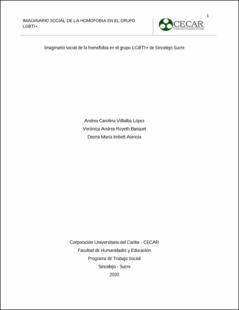Mostrar el registro sencillo del ítem
Imaginario social de la homofobia en el grupo LGBTI+ de Sincelejo Sucre /
| dc.contributor.advisor | Godín Díaz, Rubiela de la Concepción | spa |
| dc.contributor.advisor | Garizabal Amaris, Tatiana Marcela | spa |
| dc.contributor.author | Villalba López, Andrea Carolina | spa |
| dc.contributor.author | Royeth Banquet, Verónica Andrea | spa |
| dc.contributor.author | Imbett Atencia, Danna María | spa |
| dc.date.accessioned | 2023-05-05T19:33:13Z | |
| dc.date.available | 2023-05-05T19:33:13Z | |
| dc.date.issued | 2020 | spa |
| dc.identifier.uri | https://repositorio.cecar.edu.co/handle/cecar/7407 | |
| dc.description | 70 páginas ; figuras, tablas | spa |
| dc.description.abstract | Actualmente, se han encontrado diversas opiniones y posturas tanto en la sociedad en general como en el propio grupo LGBTI+ sobre los derechos que están siendo reconocidos para esta población. Es por ello que la presente investigación tiene como objetivo develar el imaginario social que tiene el grupo LGBTI+ acerca de la homofobia en Sincelejo, Sucre. Metodología. Se tomó como base el enfoque cualitativo, con un diseño hermenéutico y se utilizó la entrevista abierta como herramienta para la recolección de datos. Resultados principales. Se apuntó a conocer los pensamientos, emociones y actitudes que tienen los miembros del grupo LGBTI+ para comprender su imaginario social, partiendo del proceso que cada uno de los entrevistados experimentó de manera personal y espontanea al momento de manifestar abiertamente su orientación sexual y aceptación de la misma. A partir del proceso investigativo se pudo apreciar en sus discursos la existencia de un imaginario, visto a través de las actitudes, múltiples emociones y distintos pensamientos a situaciones homofóbicas latentes y visibles en cualquier ámbito donde se socializan. Conclusiones y recomendaciones finales. Teniendo en cuenta la investigación realizada es palpable que aún existe una falta de conocimiento y empatía acerca del tema de estudio, lo que conduce a considerar la homofobia como un problema social que afecta de manera directa e indirecta a los involucrados y a sus redes de apoyo, puesto que la homofobia es un punto relevante y notorio en el país. El trabajo. | spa |
| dc.description.abstract | Currently, diverse opinions and positions have been found both in society in general and in the LGBTI + group itself about the rights that are being recognized for this population. That is why the present research aims to unveil the social imaginary that the LGBTI + group has about homophobia in Sincelejo, Sucre. Methodology. The qualitative approach was taken as a basis, with a hermeneutical design and the open interview was used as a tool for data collection. Main results. It was aimed to know the thoughts, emotions and attitudes that the members of the LGBTI + group have to understand their social imaginary, starting from the process that each of the interviewees experienced in a personal and spontaneous way at the moment of openly manifesting their sexual orientation and acceptance of the itself. From the investigative process, the existence of an imaginary could be appreciated in their speeches, seen through attitudes, multiple emotions and different thoughts to latent and visible homophobic situations in any environment where they are socialized. Final conclusions and recommendations. Taking into account the research carried out, it is palpable that there is still a lack of knowledge and empathy about the subject of study, which leads to consider homophobia as a social problem that directly and indirectly affects those involved and their support networks. since homophobia is a relevant and notorious point in the country. El trabajo. | spa |
| dc.format.extent | 70 páginas | spa |
| dc.language.iso | spa Español | spa |
| dc.publisher | Corporación Universitaria del Caribe - CECAR | spa |
| dc.rights.uri | https://creativecommons.org/licenses/by-nc-nd/4.0/ | spa |
| dc.title | Imaginario social de la homofobia en el grupo LGBTI+ de Sincelejo Sucre / | spa |
| dc.type | Trabajo de grado - Pregrado | spa |
| dc.description.degreelevel | Pregrado | spa |
| dc.description.degreename | Trabajador Social | spa |
| dc.description.notes | Trabajo de grado(Profesional en Trabajo Social) --Corporación Universitaria del Caribe. Facultad de Humanidades y Educación. Programa de Trabajo Social. Sincelejo, 2020. | spa |
| dc.description.notes | Incluye referencias bibliográficas. | spa |
| dc.identifier.local | TS-08342 2020 | spa |
| dc.identifier.url | https://catalogo.cecar.edu.co/bib/33655 | spa |
| dc.publisher.faculty | Facultad de Humanidades y Educación | spa |
| dc.publisher.place | Sincelejo | spa |
| dc.publisher.program | Trabajo Social | spa |
| dc.rights.accessrights | info:eu-repo/semantics/openAccess | spa |
| dc.rights.creativecommons | Atribución-NoComercial 4.0 Internacional (CC BY-NC 4.0) | spa |
| dc.subject.lemb | Homosexualidad -- Sincelejo -- Sucre (Colombia). | spa |
| dc.subject.lemb | Homofobia -- Sincelejo -- Sucre (Colombia). | spa |
| dc.subject.lemb | Discriminación -- Sincelejo -- Sucre (Colombia). | spa |
| dc.subject.lemb | Tesis y disertaciones académicas. | spa |
| dc.subject.lemb | Imaginario social. | spa |
| dc.subject.lemb | Grupo LGBTI+. | spa |
| dc.type.coar | http://purl.org/coar/resource_type/c_7a1f | spa |
| dc.type.content | Text | spa |
| dc.type.driver | info:eu-repo/semantics/bachelorThesis | spa |
| dc.type.redcol | https://purl.org/redcol/resource_type/TP | spa |
| dc.type.version | info:eu-repo/semantics/submittedVersion | spa |
| oaire.accessrights | http://purl.org/coar/access_right/c_abf2 | spa |
| oaire.version | http://purl.org/coar/version/c_ab4af688f83e57aa | spa |
| dc.identifier.barcode | T-08342 | spa |
Ficheros en el ítem
Este ítem aparece en la(s) siguiente(s) colección(ones)
-
ADI. Trabajo Social [276]



